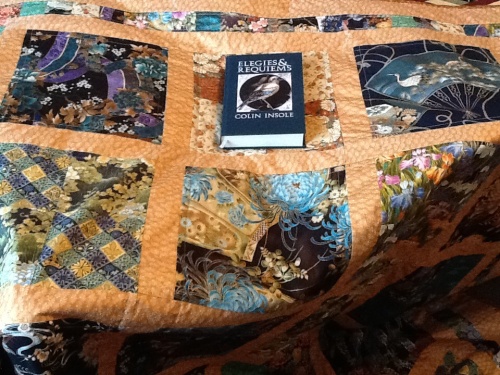from my review of ELEGIES & REQUIEMS (Side Real Press) here.
The Bellman
"I too observed 'the bones of the precluded pomp' and 'the dark thing waiting for a soul'."
I normally expect an anthology or collection to end with its own musical coda, something that I'd nod at and say yes we can go now.
Yet, this substantial story is more remarkable than any such considerations - as if we have been merely teased before in this book, and this is the real thing.
It tells of a Museum of Lost London, out-Ackroyding Ackroyd, a story with a central tract of an account of a past pageant of jubilee, an erstwhile 'flashmob' as it were, done with posters. And its recurrence through history. This is major stuff. There is no way I can even give you an inkling of the power of this story, its allusions, its style of descriptions of upper and lower London, its sheer chilling implications, and I'd dub myself the Bellman of this story, nay, of this whole book if I could, but others will clamour to outdo me first. I thought, when writing my review of this story, I would lay into its 'delights' with gusto, lay bare for you its dreams and nightmares, its truths and its (hopefully!) fictions. But it just IS. Read it for yourself. You will never be the same again. And I'd say the same thing for the whole book, too. Oyez, Oyez, come to the dark journey through the forgotten city streets of your own mind and beyond.
As in Apoplexy and Blackthorn, the text if written cannot be unwritten. It creates its own reality. The deed is done. It WILL affect you, come what may. Even if only by what I earlier called object-osmosis. And the style is immaculate as is the construction of the whole book. Visionary and decadent.
And this last story also conveys what Bowen described in one of her novels and some of her stories as her own visionary version of these mobs of her Blitz, her dark crowd shapes and thus she prefigured this story with what she saw coming through the dust and clamour of war, and so does Insole: "And there were worse things we saw in the Blitz. As the city burned, we saw them mocking us from the ruins. The dead didn't come to mourn but to rejoice."
----------------------------------------------
From Chapter 4 of ‘The Heat of the Day’ (1949) by Elizabeth Bowen:
They had met one another, at first not very often, throughout that heady autumn of the first London air raids. Never had any season been more felt; one bought the poetic sense of it with the sense of death. Out of mists of morning charred by the smoke from ruins each day rose to a height of unmisty glitter; between the last of sunset and first note of the siren the darkening glassy tenseness of evening was drawn fine. From the moment of waking you tasted the sweet autumn not less because of an acridity on the tongue and nostrils; and as the singed dust settled and smoke diluted you felt more and more called upon to observe the daytime as a pure and curious holiday from fear. [...]
Most of all the dead, from mortuaries, from under cataracts of rubble, made their anonymous presence – not as today’s dead but as yesterday’s living – felt through London. Uncounted, they continued to move in shoals through the city day, pervading everything to be seen or heard or felt with their torn-off senses, drawing on this tomorrow they had expected – for death cannot be so sudden as that. [...]
The wall between the living and the living became less solid as the wall between the living and the dead thinned. In that September transparency people became transparent, only to be located by the just darker flicker of their hearts. [...]


No comments:
Post a Comment